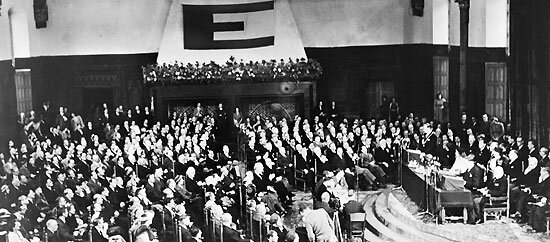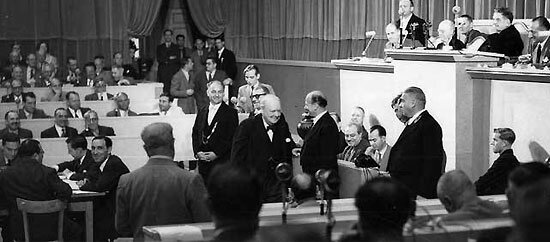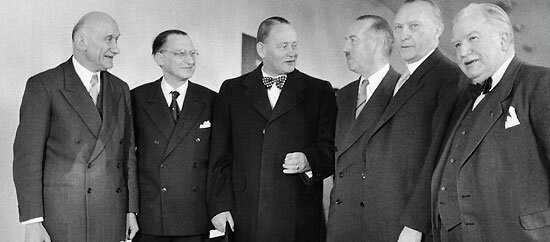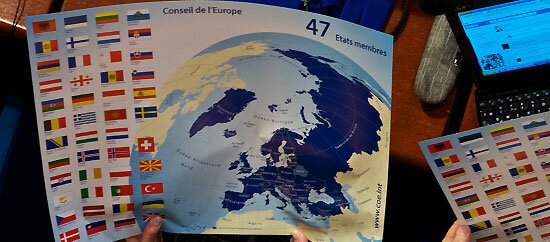




The idea of a united Europe, and of the establishment of some body representatives of Europe as a whole and competent to speak, perhaps to act, on its behalf, was commonly advanced at least as early as the XIXth century. Only in the XXth century, however, has that idea taken concrete form – and then not until the First world War had demonstrated its necessity. In the main the proponents of what is now customarily called the “European idea” have fallen into two groups, the first advocating co-operation and co-ordination of policies between European States without demanding of the latter formal surrenders of sovereignty, the second urging a Federation of Europe.
1930
The so-called “Briand Plan” of 1930 is an example of the first approach: the proposals put forward in the name of the French Government, for all that they appeared in a Memorandum “on the organisation of a system of European Federal Union”, required no more in effect than the creation of a European section, rather more closely-knit, of the League of Nations. The efforts of Count Richard Coudenhove-Kalergi are a notable example of the second.
1946
During and after the Second World War the European idea gained greatly in force and in the number and, authority of its exponents. Twice during the War Winston Churchill publicly expressed his conviction that Europe, when hostilities had ceased, must join together; and on at least one occasion he wrote specifically of a “Council of Europe”‘. On 19th September, 1946, in a famous speech at Zürich, he called for the definitive ending of the feud between France and Germany and for these two States, in friendly alliance, to constitute the nucleus of “a kind of United States of Europe”. Later he was to write: “My counsel to Europe can be given in a single word: Unite!”
1947
His words met with widespread and enthusiastic response. No sooner had the War ended than a large number of private movements and organisations concerned to sponsor and foster the idea of a United Europe sprang up, arousing great interest among wide sections of the population. In 1947 these various groups decided to co-ordinate their activities and increase their effectiveness by jointly creating one central movement, to be known as the “European Movement”. The next important step was taken in 1948. In May of that year a Congress was convened at The Hague to discuss and make proposals for a body to represent democratic Europe. The Congress, in which some 800 Ministers, Members of Parliaments, trade unionists, artists, journalists, economists and members of the liberal professions took part, came out in favour of the creation of a European assembly and of various measures for bringing European policies into line economically, socially and politically, the whole resting on a common acceptance of human rights.
1948
At the same time the idea of an European body had been taken up by the five Brussels Treaty Powers, to which Mr.Paul-Henri Spaak, then Prime Minister of Belgium, undertook to convey the Resolutions adopted by the Hague Congress. After some months of negotiations between the Governments as to whether this body should be purely inter-governmental or should follow more closely the ideas sponsored by the European Movement, a Conference of Ambassadors produced a plan for a new kind of European Organization in which the conventional Ministerial organ should have as counterpart a Parliamentary Assembly.
1949
On 5th May, 1949 the five Governments Members of the Brussels Treaty (Belgium, France, Luxembourg, the Netherlands and the United Kingdom) and the Governments of Denmark, Ireland, Italy, Norway and Sweden signed in London the Statute of this new body, the Council of Europe. The Parliamentary Assembly of the Council of Europe (PACE), which held its first session on 10 August 1949, can be considered the oldest international parliamentary Assembly with a pluralistic composition of democratically elected members of parliament established on the basis of an intergovernmental treaty. The Assembly is one of the two statutory organs of the Council of Europe, which is composed of a Committee of Ministers (the Ministers of Foreign Affairs, meeting usually at the level of their deputies) and an Assembly representing the political forces in its member states.
1950-2013
The statutory aim of the Council of Europe, which started with ten member states and now has 47, is to achieve greater unity among its members through common action, agreements and debates. The conditions for membership are pluralistic democracy, the rule of law and respect for human rights. Only those countries, which fulfill these criteria, can accede. Consequently some countries were only able to join the Organisation at a subsequent stage; i.e. Portugal in 1976, Spain in 1977. Greece was obliged to withdraw from the Council of Europe in 1970 for a period of four years.
The Knesset of Israel participates in the work of the Parliamentary Assembly as an Observer since 1957, the Parliament of Canada since May 1997 and the Parliament of Mexico since November 1999.
The United States of America were granted Observer status with the Council of Europe on 10 January, Canada on 29 May, Japan on 21 November 1996 and Mexico on 7 December 1999.
The democratisation process in Central and Eastern Europe led to Hungary’s accession in 1990, Poland’s in 1991, Bulgaria’s in 1992 and Estonia, Lithuania, Slovenia and Romania in 1993. That of the Czech Republic and the Slovak Republic replaced Czechoslovakia’s accession from 1991 in 1993. Latvia joined the Council of Europe on 10 February, Moldova and Albania on 13 July and Ukraine and the former Yugoslav Republic of Macedonia on 9 November 1995. The Russian Federation acceded on 28 February, Croatia on 6 November 1996, Georgia on 27 April 1999, Armenia and Azerbaijan on 25 January 2001, Bosnia and Herzegovina on 24 April 2002 and Serbia and Montenegro on 3 April 2003. Following the declaration of independence of the Republic of Montenegro on 3 June 2006, and in accordance with Article 60 of the Constitutional Charter of the State Union of Serbia and Montenegro, the Republic of Serbia continues membership of the State Union in the Council of Europe. On Friday 11 May, the Republic of Montenegro joined the Council of Europe as its 47th member.
